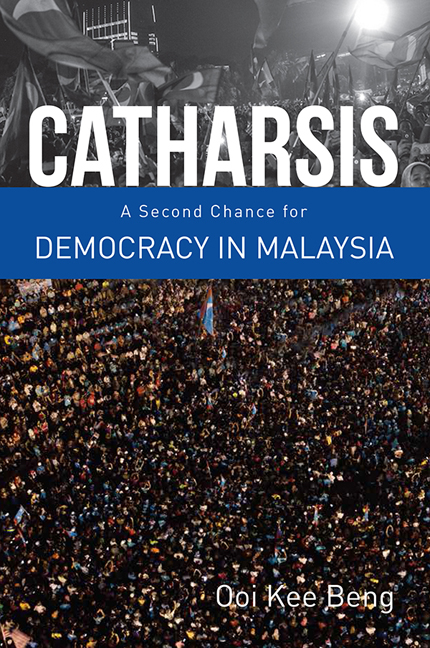Book contents
- Frontmatter
- Contents
- Foreword
- 1 Introduction – Malaysia's Future Is Redeemed
- Before Pakatan Harapan
- Before 9 May 2018
- With Mahathir at the Helm
- 31 One Thing Is Certain—There Will Be More Amendments to the Constitution
- 32 The More Things Change, the More Things May Actually Change
- 33 Did Merdeka Liberate or Create Malaya?
- 34 Interview with Nurul Izzah Anwar: Rebuilding a Nation Long Divided
- 35 The Diminishing of Humans Through Identity Politics
- 36 The Art of Dismantling Cultural Pluralism
- 37 No Need to Let Bigots Dictate Policy
- 38 What the Penang Floods Say About Malaysian Politics (and It's Not Just About Climate Change)
- 39 This is the Moment of Truth for Malaysia's Race-based Politics
- 40 We are Equal Only Through Our Vote
- 41 Why the Opposition Has a Shot at Toppling the Barisan Nasional with Mahathir at the Helm
- 42 Spiralling Back towards Reformasi
- 43 Individual Freedom Is a Matter of National Survival
- 44 Why Meet the Twenty-first Century with Twentieth Century Mindsets?
- 45 A Final Quarrel between a Repentant Grandfather and Oldfashioned Self-absorbed Parents
- 46 Outraged Enough to Go Vote or Cynical Enough to Stay Home?
- Beyond 9 May 2018
- About the Author
45 - A Final Quarrel between a Repentant Grandfather and Oldfashioned Self-absorbed Parents
from With Mahathir at the Helm
Published online by Cambridge University Press: 12 February 2019
- Frontmatter
- Contents
- Foreword
- 1 Introduction – Malaysia's Future Is Redeemed
- Before Pakatan Harapan
- Before 9 May 2018
- With Mahathir at the Helm
- 31 One Thing Is Certain—There Will Be More Amendments to the Constitution
- 32 The More Things Change, the More Things May Actually Change
- 33 Did Merdeka Liberate or Create Malaya?
- 34 Interview with Nurul Izzah Anwar: Rebuilding a Nation Long Divided
- 35 The Diminishing of Humans Through Identity Politics
- 36 The Art of Dismantling Cultural Pluralism
- 37 No Need to Let Bigots Dictate Policy
- 38 What the Penang Floods Say About Malaysian Politics (and It's Not Just About Climate Change)
- 39 This is the Moment of Truth for Malaysia's Race-based Politics
- 40 We are Equal Only Through Our Vote
- 41 Why the Opposition Has a Shot at Toppling the Barisan Nasional with Mahathir at the Helm
- 42 Spiralling Back towards Reformasi
- 43 Individual Freedom Is a Matter of National Survival
- 44 Why Meet the Twenty-first Century with Twentieth Century Mindsets?
- 45 A Final Quarrel between a Repentant Grandfather and Oldfashioned Self-absorbed Parents
- 46 Outraged Enough to Go Vote or Cynical Enough to Stay Home?
- Beyond 9 May 2018
- About the Author
Summary
As the fourteenth general election draws near, the sense that Malaysia – and the whole Asia-Pacific region, for that matter, must now leap into a new era is growing stronger by the day.
What seems common to advanced countries and developing countries alike is the need for governments to realise that profound disruptions caused by the digital revolution are already happening. Their old ways of doing things and the old structures created for doing those things are now the greatest hindrance to the country's ability to take full advantage of the opportunities offered by the Fourth Industrial Revolution.
And so, where Malaysia is concerned, much courage is needed to discard the old ways of thinking that have become inhibitive and to dismantle the structures created by those old ways of thinking which now stand in the way of new strategies that suit latecomers like Malaysia.
Yes, Malaysia is a latecomer – not so much in that it started late, but in it has been a great waster of time and opportunity. And how has it been wasting time and opportunity? Answering that question is what requires courage, because it is necessarily a radical act and it is necessarily a dangerous stance because it threatens the survival of the old structures.
The South-East Asian nations founded after the Second World War began building their state apparatus, their national identity and their national economy in response to domestic tensions and external pressures. Whatever their individual solutions were, these are now from another age. Had they been successful, they would have achieved a stable and free society and made themselves largely redundant.
As with good parenting, which fosters children so that they can manage the future on their own, a nation-builder succeeds by nurturing the nation and the citizenry towards maturity. Once that is achieved, governments should merely play a supportive role to help citizens excel, just as parents of young adults should dismantle the barriers that they placed in the way of the children when they were children.
This seldom happens though. We notice it in how schoolchildren in the US recently had to take matters into their own hands against the passion of their elders for guns.
- Type
- Chapter
- Information
- CatharsisA Second Chance for Democracy in Malaysia, pp. 169 - 171Publisher: ISEAS–Yusof Ishak InstitutePrint publication year: 2018



